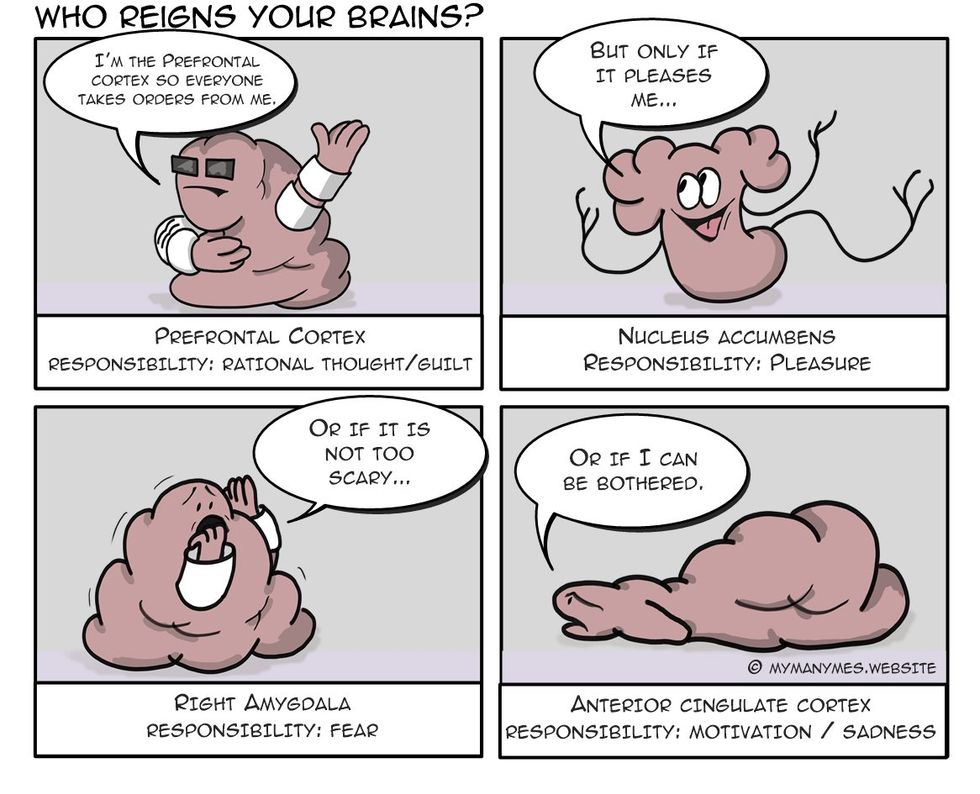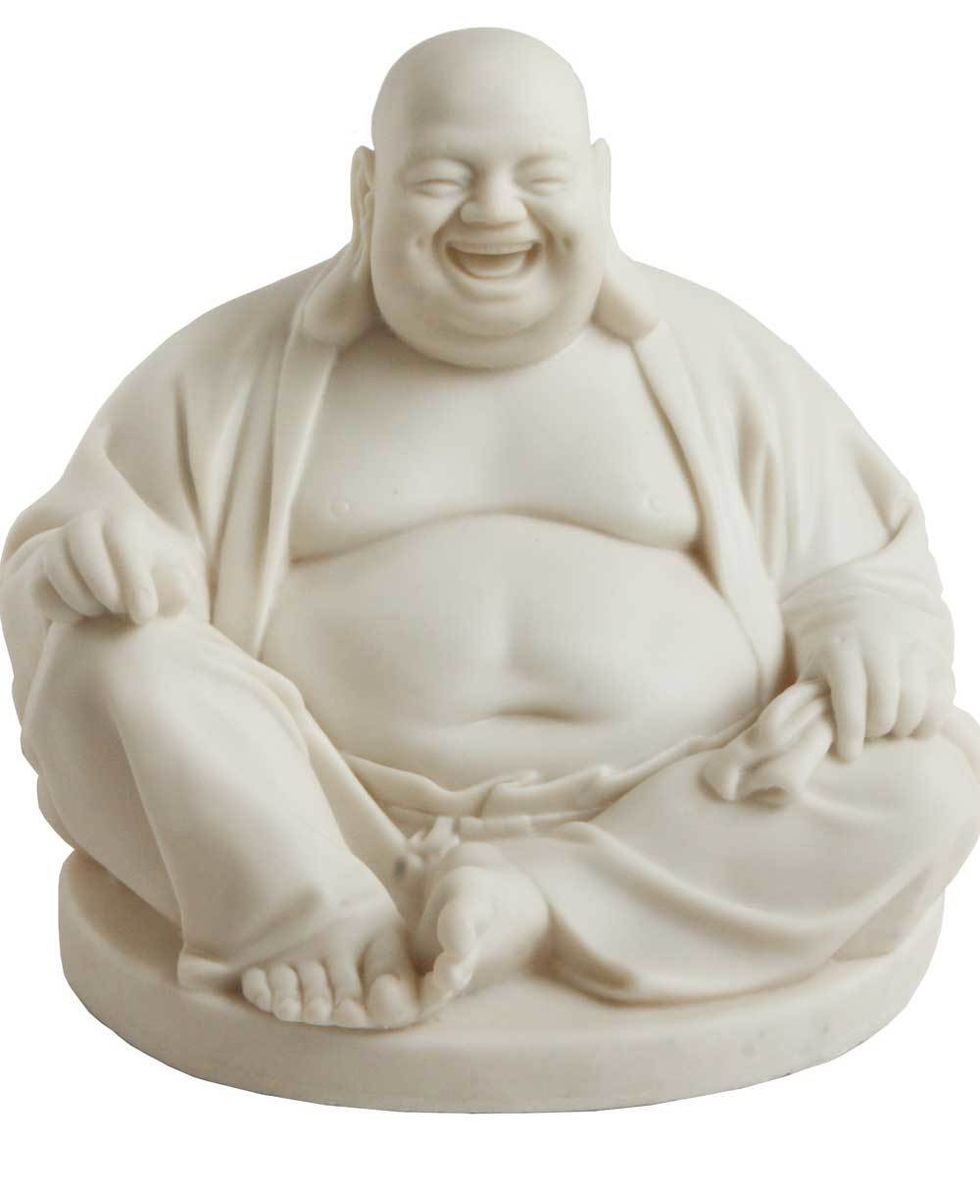When most people think of meditation, they think of someone (usually a Buddhist Monk) sitting on a pillow in a quiet room with eyes closed, humming in rhythm.
Is that what you thought of? Because I'm positive you're not the only one. If you don't know what meditation is, it is prehistoric. It first began with mantras (repetitive, rhythmic chants). The earliest records of meditation practice come from the Hindu traditions of Vendantism around 1500 BCE. In the 5th and 6th centuries, it spread to Taoist China and Buddhist India and moved forward from there.
The cool thing is, you don't have to be a Buddhist Monk to meditate. In addition to Monks, celebrities like Madonna, Lady Gaga, Hugh Jackman, Oprah Winfrey, and many more meditate. Mindfulness meditation is generally the most popular, and is used to keep you rooted in the present moment. This means that your thoughts of the past and fears of the future aren't ruling your life-- you are only here, in the present moment, right now. Anybody can meditate, and more people should. Besides the fact that it helps you sleep better, stress less, reduces anxiety, and enhances your love life (and more), there is scientific evidence that it works to change the brain and body in a positive way.
1. MRI scans show that after 8 weeks (56 days) of meditation exercises, the amygdala (fight or flight center of the brain) shrinks in cell density.
This doesn't mean you won't be able to fight back if you need to because your brain doesn't sense danger, it means there will be a reduction in the amount of times your brain senses danger when there is none. The reason we even have this fight or flight response is because prehistorically, quick choices had to be made to ensure survival-- Can I kill this tiger for dinner or am I this tiger's dinner?
Unless you are a zookeeper working with unsocialized tigers, this response is generally not as necessary as it used to be. As we have adapted, our bodies and minds have changed and threats have become less obvious. Sometimes, they aren't even real. Therefore, our bodies can react to imagined or perceived threats. This causes anxiety. Your body is just doing the thing it was meant to do, even if it's not all that necessary. Read more about that here.
2. As the amygdala shrinks from meditating, the pre-frontal cortex grows.

Plus, the connection between the amygdala and pre-frontal cortex begins to weaken after 8 weeks of meditation. This means that when you are having a fight or flight response, the brain will be able to control the emotional and physical consequences that come with it, leading to more sound and rational decision-making of how to handle your feelings of fear. I told you it was the good stuff!
3. Researchers have seen that meditators experience less pain than non-meditators.
I was skeptical about this one at first, but similar to what happens between the amygdala and prefrontal cortex, the anterior cingulate cortex (the part of the brain that tells you that pain is unpleasant) and its connection to the prefrontal cortex begin to weaken. This makes it possible to lessen the stimulation that causes pain.
It's important to note that one wouldn't be blocking the pain out of their mind by using this technique. Instead, one would not engage in thoughts to process pain, making the sensation less present. Although it is not recommended to replace pain medications with meditation, it can be used in addition to pain medication for a fully effective treatment (Read more about that here). It's also worth noting that those experiencing less pain were not in a meditative state when that effect was observed. Therefore, it's a permanent change in their perception.
4. Meditation helps reduce aging.
This is a pretty bold statement-- this is how it works. According to Dr. Elissa Epel (a professor at the University of California San Francisco) says that cells with shorter telomere length are prone to poor immune system functioning, cardiovascular disease, and degenerative conditions like osteoporosis and Alzheimer's disease. Telomere shortening happens naturally as we age, but can be accelerated by stress. However, meditation begins improving physical and mental health at the cellular level. Are you still with me?
Cells contain chromosomes, which are sequences of DNA. Telomere are protective protein caps at the end of our DNA strands that tell them to replicate. The longer the telomere, the more times the cell can be replicated. As the cell is replicated, the telomere gets shorter in a natural aging process. Telomerase is an enzyme in the body that prevents telomeres from shortening, and can even add telomeric DNA back to the telomere and help our body’s cells live for a longer period of time. What does this all mean? Meditation can support preservation of the brain structure. Read more here.
5. It generously reduces activity in the monkey mind.
"Monkey mind," also known as "monkey chatter," by my yoga instructor. She says it's the non-stop channel changing of thoughts that one experiences when their minds are wandering and unfocused. Science says "Monkey mind" another word for the Default Mode Network (DMN)-- the part of the brain responsible for mind-wandering and self-referential thoughts.
Mind wandering is generally associated with being less happy. This is because reminiscing and worrying about the past and the future are a common go-to in the monkey mind. Meditating has a serious quieting effect on monkey chatter, and not just when you're in the zone. Meditators can snap back out of it and back into the present moment because of the connections that form among the different parts of the brain.
6. Meditation can help relieve symptoms of anxiety and depression.
There have been numerous studies about how meditation helps manage anxiety and depression. While the results of positive effects may be modest, they are seen across multiple studies according to Dr. Madhav Goyal of Johns Hopkins School of Medicine. "It was surprising to see that with so little training [about 2.5 hours of meditation practice per week] we were still seeing consistent effects," Goyal wrote.
Meditation makes people more aware of their negative thoughts, which gives them less power and frequency. When we become aware of our thought process, it's much easier to let thoughts come and go, helping to not dwell in negativity. Anatomically, depression shrinks the Hippocampus (the part of the limbic system that governs learning and memory, and is extraordinarily susceptible to stress and stress-related disorders like depression or PTSD), and meditation builds the hippocampus back up. Read more about that here.
7. Meditation can help improve concentration and improve your ability to pay attention.
Concentrating is not always easy-- especially if you are under pressure or stress. It is even more difficult if you suffer from an Attention Deficit Disorder (ADD or ADHD). According to this study, just a few weeks of meditating can help improve focus and memory. One of the main benefits of meditation is learning how to obtain a strong focus of attention, since that's typically what the practice consists of. It's just a bonus to have cognitive skills improved in the long run, and science to confirm it. This goes along with the increased used of the prefrontal cortex, since that is the part of your brain that focuses heavily on concentration. See? It all goes together!
8. Studies show that given the effects on the self-control regions of the brain, meditation can be effective in helping people recover from various types of addiction.
In this study, mindfulness training was up against the American Lung Association's Freedom From Smoking (FFS) program. It shows that people who learned mindfulness were actually more likely to have quit smoking by the end of the training and 17 week follow-up, rather than those at conventional treatment. This may be associated with what was discussed before-- the weakening of the connection among brain centers. The state of craving and the act of smoking are recognized and felt individually.
Therefore, the state of craving does not always necessarily need to lead to the act of smoking. Instead, one fully experiences waves of cravings, and it able to manage those waves until they pass. Other research has shown that mindfulness training, mindfulness-based cognitive therapy (MBCT), and mindfulness-based relapse prevention (MBRP) can be helpful in treating other forms of addiction.
9. Your memory will actually improve as you meditate. It all goes along with the prefrontal cortex growing.
Another benefit of meditation is improved memory recall. It turns out this might be a side effect of another positive effect of mindfulness--better concentration and focus. According to research conducted by Catherine Kerr, people who practice mindful meditation are able to adjust the brain wave that screens out distractions and increase their productivity faster that those who did not meditate. This means that meditators are able to ignore distractions better, giving them the ability to remember more things.
10. Lastly and most importantly, it increases happiness.
Ronnie Newman, the director of research and health promotion for the Art of Living Foundation, says that it puts you on the fast track to be happy. He references studies to explain that with meditation, the brain signaling increases in the left side of the prefrontal cortex, which is responsible for positive emotions, while activity decreases in the right side, responsible for negative emotions. He also saysbenefits such as increased self-awareness and acceptance also contribute to improved overall well-being.
If you are interested in meditating but don't know where to start, I recommend downloading an app. My favorite is Headspace (the first 30 days are free! It really gives you a chance to see how you like it!), but several others exist. Reading books helps as well-- Thich Nhat Hahn writes extensively about meditation and mindfulness and is personally one of my favorite authors. You can purchase his books for cheap here. Lastly, going to a yoga class at an actual yoga studio (not a commercial place like the YMCA) most likely had guided mediation classes.






























